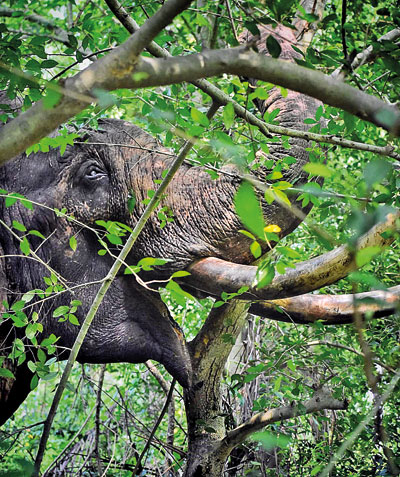News
Wounded tusker roaming in villages to stay put in natural habitat
View(s):By Kasun Warakapitiya
The Department of Wildlife Conservation (DWC) has planned to confine the ailing tusker ‘Agbo’, within the wilderness near Divul Wewa in the Thirappane area.
The Director of Wildlife Health, Dr. Tharaka Prasad, told the Sunday Times that they decided to restrict the tusker’s movements within the wilderness area between two lakes as it keeps returning to villages.
He explained that the tusker, which had been treated by wildlife officials and is currently recovering from gunshot wounds and two shattered bones, has been venturing into villages to feed on crops and is also damaging houses. 
Dr. Prasad said that the attitude of the people of neighbouring villages had changed as the tusker had become uncontrollable and aggressive and was seeking human habitation.
“People are hostile to the tusker now as they fear it might destroy the crop, which is nearing harvest, as well as attack houses where the harvest is stored,” he said.
He said the Department of Wildlife Conservation is attempting to rehabilitate the tusker by keeping it confined to an area where it cannot be translocated. The animal will not be able to endure the stress of transport by truck because of gunshot injuries to carpal bones in one leg.
“Moving the tusker could even pose a threat to its life; if we move it, we would be writing its death certificate,” he said.
Environmental groups claimed that feeding the tusker fruit and the paddy harvest while recovering from injuries had made the animal crave cultivated food, and they blamed wildlife officials.
Responding to this, Dr. Prasad said that the DWC officers are observing the animal to find the reasons for its behaviour.
“Our priority was to save the tusker’s life. At that time, the tusker had mobility issues and was unable to move long distances; therefore, to provide sustenance, we had no option but to feed it nutritional food to aid its recovery,” he said.
Dr. Prasad said that its rehabilitation remains a challenge, and yet confining the tusker for a few months and compelling it to forage for food would help revert the animal to its natural behaviour.
He added that such an effort was attempted in an earlier incident involving another elephant, but it was disrupted by a politician who attempted to intervene.
A senior official of the DWC said that they are planning and making arrangements to restrict the tusker’s movements to one area.
The official also said that an animal rights activist group along with Thai animal rights activists from an elephant sanctuary recently met President Ranil Wickremesinghe and are meeting with villagers, claiming that they can find solutions for the human-elephant conflict.
He added that the DWC has attempted to mitigate the human-elephant conflict for years but has yet to find a solution and believes that non-governmental organisations too will not be able to resolve the issues.
| Wildlife in the hands of handicapped state institution The Department of Wildlife Conservation is facing many shortcomings due to a lack of staff. Dr. Tharaka Prasad, director of Wildlife Health, said that there are 18 vacancies for wildlife veterinary surgeons. He said filling the vaccines is a priority and requested approval from the ministry to make new recruitments. He said that even when treating ‘Agbo’, a team of 12 veterinary surgeons was involved. Each was given a specific task, as the tusker is partially anaesthetized when being treated. “We have limited time to treat an animal when it is under anaesthesia; therefore, we have to delegate chores to many veterinarians to carry out the task smoothly,” he said. He said that although there is a need for a dedicated veterinary hospital for elephants within a wildlife area, the DWC cannot even think of such an endeavour as there would be a shortage of veterinarians and officials for such a facility. He said the DWC is also short of experienced staff and that a large number of officials are nearing retirement age. “There was a new requirement of 4,500 wildlife officers, yet they lack experience; therefore, training them would take time.” | |
The best way to say that you found the home of your dreams is by finding it on Hitad.lk. We have listings for apartments for sale or rent in Sri Lanka, no matter what locale you're looking for! Whether you live in Colombo, Galle, Kandy, Matara, Jaffna and more - we've got them all!

